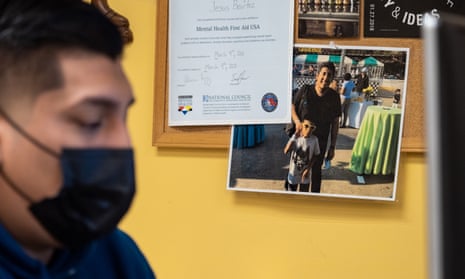While his wife was in labor in the hospital with their third child, Joshua Castillo was in the waiting room completing a computer science final and two quizzes.
By then he was accustomed to juggling the demands of fatherhood with the unyielding deadlines and expectations of Northern Virginia Community College, where he is studying computer science while working full time and helping raise his kids – a responsibility for which he said he doesn’t get much faculty sympathy.
“Most professors that I’ve come across are really in the mindset of, this is your full-time job, this is all you have to worry about right now.”
Castillo is one of about 3.8 million students raising children while in college. About 70% of them are women, according to education department data analyzed by the Institute for Women’s Policy Research. But about 1.1 million are fathers, who are often overlooked and face even longer odds of graduating.
“If student parents are an invisible population, student dads are ghosts,” said Autumn Green, who researches student parents at Wellesley College.
Sixty-one per cent of student fathers drop out of college without degrees, compared with 48% of student mothers, the Institute for Women’s Policy Research finds. Among single, Black and Latino fathers, the dropout rate is about 70%.
There’s been little attention paid to the dismal graduation rates of student fathers – despite alarm bells over the huge decline in the number of men overall who are attending and graduating from college.
Enrollment has dropped nearly twice as much for men as for women since the start of the pandemic, according to the National Student Clearinghouse Research Center, and women now outnumber men in higher education by 59 to 41%.
“Further research needs to be done for us to be able to pinpoint why” so many men with children drop out, said Chaunté White, senior research associate at the Institute for Women’s Policy Research.
Despite a lack of research about student fathers specifically, experts say that they are affected by many of the same issues that challenge student mothers. Those include struggling with finances and childcare, while also fitting children, work and class into the day.
About half of all student parents are people of color, who often face further barriers to graduation.
“We know that Black and brown fathers coming into higher ed are coming in with some significant disadvantages,” said Nicole Lynn Lewis, the founder of Generation Hope, who was also a student mother. “Not only is it the student-parent experience and all of the obstacles that are attached to that, but it’s also the experience of being a Black man and trying to earn your education in a higher ed system and even in an education system more broadly that wasn’t designed for you.”
Men without degrees have better access than women to jobs that require only high school diplomas and are financially rewarding but physically demanding, such as welding and construction. Those jobs can divert them from going to college in the first place or, if they do go, take them away from their studies and make them more likely to quit school.
Student fathers are less often brought into programs for student parents, experts have noted, and may feel less comfortable asking for help, such as time off when their kids are sick.
Some experts believe that student fathers’ graduation problems are cultural and connected to the reasons men are less likely than women to go to college in the first place.
“One of the biggest things is that familial pressure, that social pressure of being a provider,” said Adrian Huerta, an assistant professor of education at the University of Southern California who researches parents in community colleges in the state. “That’s where education becomes a second or third or fourth priority to everything else.”

That social pressure is among the reasons Jesus Benitez found it difficult to finish college. He had his son at 17 and dropped out of high school. By 18, he was a single father.
Growing up in the Bronx, New York, Benitez spent a lot of time taking care of his younger siblings because his mother worked so much. He saw the same dynamic starting to happen with his own child.
“I was working too much, not being there for my son,” he said. “And I decided to go back to school.”
Benitez got his GED diploma through Cuny Fatherhood Academy, a City University of New York program for Black and Latino fathers. Mentors in the program pushed him to get his associate degree at LaGuardia Community College in Queens, where the Fatherhood Academy started.
Benitez worked full time on campus while attending LaGuardia and then City College in Manhattan, a four-year college. At one point, he considered dropping out.
“I grew up in the streets, so me being in college, it was just, like, ‘What am I doing here? I shouldn’t even be in this room with all of these book-smart kids,’” he said. “I was, like, ‘Man, I’m losing money, I should be going to work.’”
But the same mentors who had pushed him to pursue a degree in the first place were there to push him back when he felt like quitting.
“They went out and looked for me, to bring me back to school,” Benitez said. “If it wasn’t for them constantly helping me out, I don’t think I would have finished.”
The Fatherhood Academy program is one of the very few in the country for student fathers. It prepares men with children for high school equivalency tests and college by providing classes, tutoring, counseling, parenting seminars and weekly stipends.
One of the most powerful things about the Fatherhood Academy, said Raheem Brooks, who directs the program at LaGuardia, is getting fathers in a room together to talk.
“A lot of our guys, if you were to poll them, many of them didn’t have fathers in their lives or [they had] fathers that weren’t that involved,” Brooks said. “They don’t want to continue that negative legacy, they want to empower their kids and be in their children’s lives.”
About 77% of students complete the program. Benitez received his bachelor’s degree in philosophy in May 2020. Now he’s a mentor in the program and a parent adviser at the Aspen Institute.
Helping fathers graduate, experts said, is about more than individual men. When fathers go to school, they are more likely to earn wages that can sustain their families, and their children are more likely to also go to college. That, in turn, can boost the economy.
Short of creating programs like the Fatherhood Academy, experts said, colleges could expand childcare on campus, award more grants and scholarships for parents, revisit policies around allowing children in classrooms and offices and collect more data.
But student fathers say the first step is just reminding people that they exist.
“Fathers,” Benitez said, “are the forgotten parents.”
This story about student fathers was produced by the Hechinger Report, a non-profit, independent news organization focused on inequality and innovation in education. Sign up for their higher education newsletter
